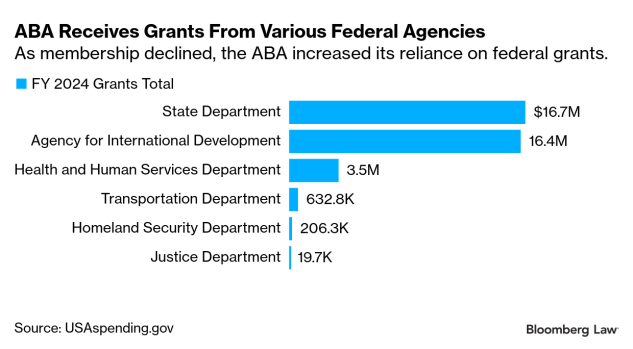- ABA is criticized over diversity efforts
- Attacks underscore need for response
The Trump administration’s latest attacks on the American Bar Association threaten the group’s revenue streams, along with its power and prestige.
The professional legal organization is suing the Trump administration over its planned cuts to USAID from which it derives a significant amount of grant money. The ABA has had tens of millions of dollars in USAID and State Department funding frozen, it said in the lawsuit filed Feb. 11.
The Justice Department on Feb. 28 threatened to pull the ABA’s accreditation powers for law schools if it doesn’t drop a diversity rule. The administration and allies also cut ABA memberships, backed out of a conference at the last minute and called for a hiring-bias investigation.
There are “lots of things the Trump administration can do” to further hurt the group, like cutting federal contracts and scuttling more memberships, said Richard Pierce, a law professor at George Washington Law School. Losing accreditation authority “would be a tremendously big hit to the prestige and status of the ABA,” he said.
The ABA’s access to federal grants may be at risk, said Skylar Croy, associate counsel at the Wisconsin Institute for Life and Liberty. It’s one of the groups that asked the US Equal Employment Opportunity Commission to investigate the ABA over a diversity initiative.
“We will see the Trump administration be very, very skeptical to award future grants to entities with a history like the ABA that are viewed as being pro-DEI and pro affirmative action,” Croy said. “They have a lot of risk exposure.”
The group has recently been more dependent on grants in the face of declining membership.
The threats underscore the urgency for the organization to come up with new ways to defend itself. The ABA has likely tapped outside counsel to help build a strategy that aims to appease the Trump administration and protect core ideals to satisfy members, said Esther Lander, an Orrick, Herrington & Sutcliffe partner who works on employment discrimination cases and investigations.
“I don’t think the ABA is unique,” Lander said. “A lot of companies are concerned about being on some list by some agency of the federal government because of those diversity, equity, and inclusion initiatives.”
Trump on Thursday ordered the EEOC to investigate at least 15 of the country’s largest law firms over their DEI programs.
ABA representatives declined to comment for this story on what steps it plans to take in response to the Trump administration’s actions.
Holding Pattern
The ABA already had paused enforcement of a diversity, equity and inclusion mandate for the nearly 200 law schools it accredits by the time Bondi threatened to kill its accreditation power. The ABA also said it would consider changes to the policy.
The organization broadened its DEI requirements for a diversity clerkship program after Trump-aligned advocacy groups last month called on the EEOC to investigate.
The ABA also has issued general statements pushing back against the administration.
“We will not stay silent in the face of efforts to remake the legal profession into something that rewards those who agree with the government and punishes those who do not,” the group said in a March 3 statement.
The ABA a month earlier condemned Trump administration moves “that appear to question the legitimacy of judicial review and demand impeachment of a judge merely because the court did not agree with the government’s position.”
The organization should keep making strong statements that will attract new dues-paying members to help sustain it, said Jenny Yang, former chair of the EEOC during the Obama administration.
“There will be more engagement from individual lawyers because the rule of law is what we’ve dedicated our life to, and we have a serious threat of an administration not following the rule of law,” Yang said.
Target for Conservatives
The ABA since its founding 146 years ago has served as the preeminent voice of the US legal establishment. With 400,000 members and chapters in all 50 states and the District of Columbia, it sets ethics standards, provides continuing education training, holds conferences, and advocates for public service.
But the group has taken a turn to the left, according to conservatives.
President George W. Bush’s administration in 2001 stopped sending judicial nominees to the ABA for vetting, a practice that had been in place since Dwight D. Eisenhower. Conservatives in the years since have increasingly voiced dissatisfaction with the group’s opinions and actions.
“It doesn’t have the neutrality, whether actual or perceived, that it might have once had,” Derek Muller, a professor at the University of Notre Dame Law School, said of the ABA. “It’s just lost its influence more generally as a result.”
Federal Trade Commission Chairman Andrew Ferguson on Feb. 14 banned staff from holding ABA leadership positions, attending group events, or renewing memberships with the organization. He cited the ABA’s “history of leftist advocacy” and its attacks on Trump’s actions.
Senior Justice Department attorneys at the last minute backed out of an ABA white-collar crime conference this month in Miami.
“For the first time in my memory, organizations like the American Bar Association are being attacked in a way for just doing what they’ve always done,” said Michael Posner, a lawyer and former assistant secretary of state in the Obama administration.
To contact the reporter on this story:
To contact the editors responsible for this story:
Learn more about Bloomberg Law or Log In to keep reading:
See Breaking News in Context
Bloomberg Law provides trusted coverage of current events enhanced with legal analysis.
Already a subscriber?
Log in to keep reading or access research tools and resources.

